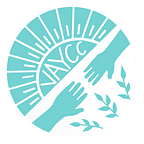An Interview with Former Director of ACLU, Claire Gastañaga, on Voter Education
Henry Haggard and Akshara Santoshkumar, VAYCC student ambassadors, have interviewed the former director of the American Civil Liberties Union (ACLU) of Virginia, Claire Gastañaga as part of VAYCC’s voter education initiative.
Accessibility
Accessibility has become a major issue during the pandemic due to the shift from mainly in-person to absentee voting and the subsequent USPS controversy. According to Gastañaga polling locations have disproportionate access where many counties in Virginia have only one absentee ballot box. Many of the economically disadvantaged and minorities are forced to travel up to three hours by bus to vote! Access to voting must be widely available to ensure racial justice at the ballot box.
Voter Fraud and Intimidation
Voter Fraud occurs when people vote illegally by voting twice, voting under a fake identity, or voting without citizenship. The Trump administration often plays up voter fraud to make it appear as a big problem. Claire Gastañaga described it as an “excuse to justify the policies that stop people from voting.”
Voter intimidation is where many people target, intimidate, or coerce others to stop specific groups from voting. For the ACLU and many other organizations, voter intimidation is a real threat as it can suppress a large majority of the vote in what is the most polarizing and crucial election yet. Anyone who cannot vote in person should vote early or request an absentee ballot.
Voter Disenfranchisement is where citizens who have been convicted of a felony have to go through a special process where the governor of Virginia has to sign off on their re-enfranchisement. This process puts people of color at a disadvantage. The process often misinterprets the process as automatic. In Virginia, the rate of incarceration is actually much more than the rate of re-enfranchisement.
Redistricting Amendment is a new, controversial amendment on the Virginia Ballot this upcoming Election stating that a commission will draw the district lines. The commission will consist of eight lawmakers and citizens picked by party leaders. The Supreme Court will make the lines if the commission fails where Republicans hold a 6–1 majority.
In the election voters would have to make a decision if they would like the vote affirmative or wait for another amendment during the 2030 cycle. Click here to learn more.
What is at Stake?
This election is a game-changer for many issues being discussed. We have to focus on what is at stake and the change that we as individuals can create. According to Gastanga “ “we have to decide if we are the United States of America or the States of America.”
What can you do?
1. If you are over eighteen, get out and vote! This is the most important election yet, so every vote counts.
2. If you are younger than eighteen educate yourself on the policies of each candidate in both the general election and local races. Local races are important because the representatives are the ones who are going
to be implementing policies that will affect you.
3. Use the internet! Our world has become increasingly digitized, we have the power to reach a much larger audience than we ever have before so keep liking and sharing posts (checkout @wevoteva for VA related info)
4. Have respectful conversations and foster positive, meaningful discussions and debates.
Akshara Santoshkumar is a sophomore who is passionate about international affairs and current events while advocating for climate change with VAYCC. She lives in Fairfax, Virginia.
